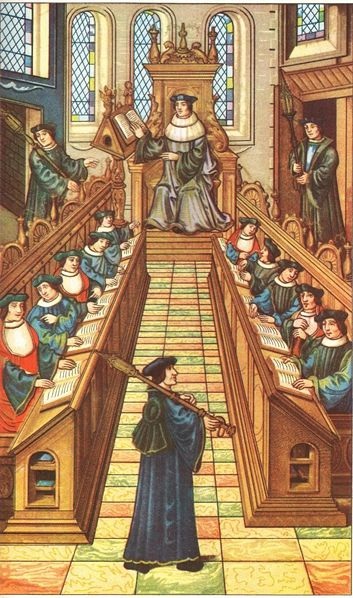Not many of you should become teachers, my brothers...
However, I do not believe that the judgment for teaching false doctrines is what James is himself concerned about in this passage.
I think if taken in stride with the rest of the chapter and into chapter four, it becomes evident that what James is really getting at is not necessarily the content of teaching, but the character of the teacher.
While it's true that those who teach false doctrines in the church are judged with a stricter judgment, it's not necessarily just on the basis of what they teach. That is certainly the case in part (again, consult 1 Corinthians 3:5-15), but it's true that even those who teach true doctrines in the church are judged with a stricter judgment as well. And why is that? Well, there's a very simple explanation: "Everyone when he is fully trained will be like his teacher" (Lk. 6:40). Students (or disciples) tend not only to take on the beliefs and practices of their teachers, but they take on their characteristics as well. That is why James constructs this passage of Scripture the way he does. He goes into great detail about how hard it is to bridle the tongue (Jas. 3:7-8). And he deals with the irony many of us struggle with on a daily basis regarding the use of our tongues (Jas. 3:9-10). But he starts the entire section with the introduction that while it has application to all, it's specifically directed to aspiring teachers in the church. Let me explain...
He begins with addressing aspiring teachers:
Not many of you should become teachers, my brothers, for you know that we who teach will be judged with greater strictness.
But he goes on to address the general population:
For we all stumble in many ways, and if anyone does not stumble in what he says, he is a perfect man, able also to bridle his whole body.
Yet as we continue reading, who is he singling out later down in the text?
Who is wise and understanding among you?
While it is the norm for all Christians to think and behave wisely (Rom. 16:19; Eph. 5:15), in New Testament usage the way the term (or phrase) is used here is generally applied to those who either are in a teaching position or are aspiring to be in a teaching position (cf. Lk. 10:21; 1 Cor. 1:20; 1 Cor. 3:18).
So James is basically asking: "Who is the teacher among you?" (Jas. 3:13) And the answer? Who is wise and understanding among you? Who is the teacher among you? By his good conduct let him show his works in the meekness of wisdom.
The one qualified to be a teacher is the one who is characterized by his meekness, and thus one who is able to tame his tongue.
And is that not one of the greatest qualities you can have in any teacher? A person who is humble and, can I add, has the ability and attitude of still being teachable. If we press on through the rest of the text we will find James contrasts such a person with bad teacher qualities such as "jealously and selfish ambition" (Jas. 3:14), boastfulness and pride (Jas. 3:14, 4:6ff), and speaking evil against others - even other brothers in Christ (Jas. 4:11). Sadly, there are many such "teachers" in the church today. But what does James say? Not many of you should become teachers, my brothers...By his good conduct let him show his works in the meekness of wisdom.
Do you know what is very easy when you're a teacher in the church (or aspiring to become one)?
Even if that's the case (if a fellow brother is ignorant of God's truth or is somehow unable or unwilling to recognize it), that never gives the teacher the prerogative to act outside the bounds of the wisdom of meekness and humility. There is certainly a time for a teacher or shepherd of God's flock to be stern in his warnings and rebukes (1 Tim. 5:20; Ti. 1:13, 2:15), but even then it's never for him to correct with a spirit of hostility, but with one of love and gentleness (2 Tim. 2:24-26). Yes - right doctrine is extremely important in terms of being a teacher in the church (1 Cor. 3:5-15; Ti. 2:1; 2 Pet. 2:1-21). But there is more to being a teacher than the doctrine you espouse.
There is the very important qualification of being humble and exemplifying the meekness of wisdom that James discusses so vividly - a character quality that is devoid of pride, selfish ambition, and speaking crudely of others - especially of your other brothers and sisters in Christ.
Whether you are currently a teacher in the church or are aspiring to be one, it is certainly of utmost importance to get your doctrine right. But we would be fools to think we can stop there. God views character very much as part of the teacher equation. So whether evaluating others or yourself, I think it's important to reflect on this idea: Who is the teacher among you? By his good conduct let him show his works in the meekness of wisdom.
To be clear so as to avoid any accusations, by God's grace I assure you I am writing this post with myself in the forefront of my mind. But I thought it was worth sharing in the hopes that it might be encouraging to others too.
|
Categories
All
|
